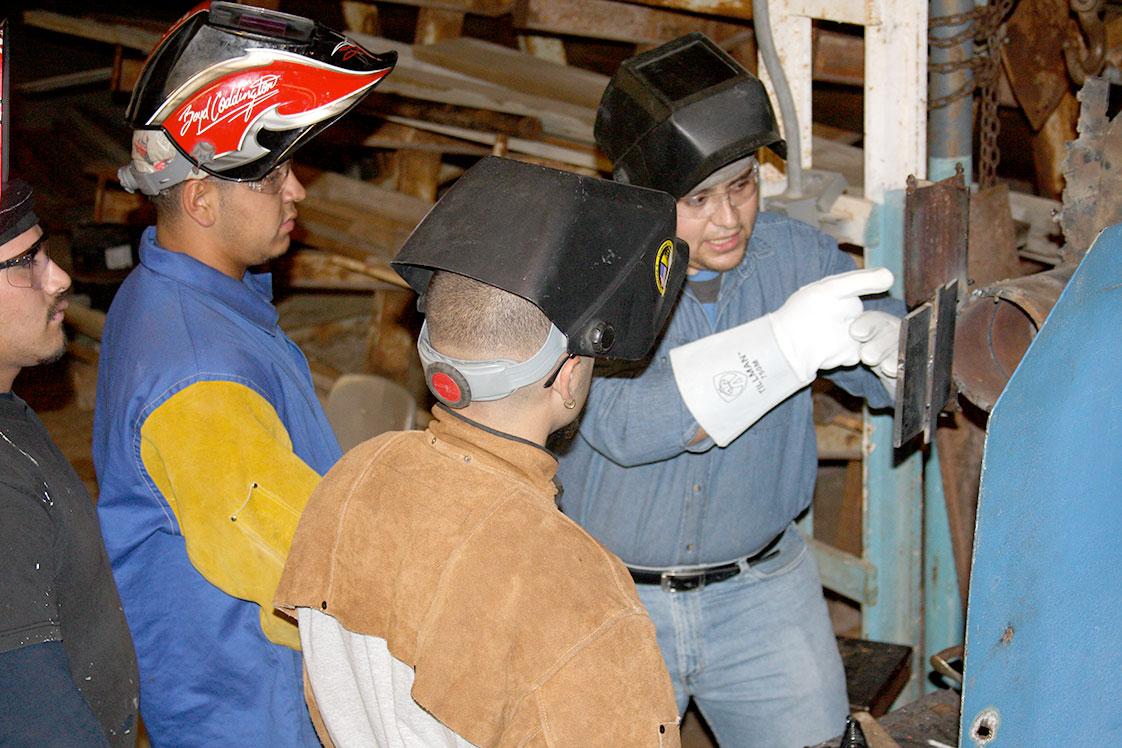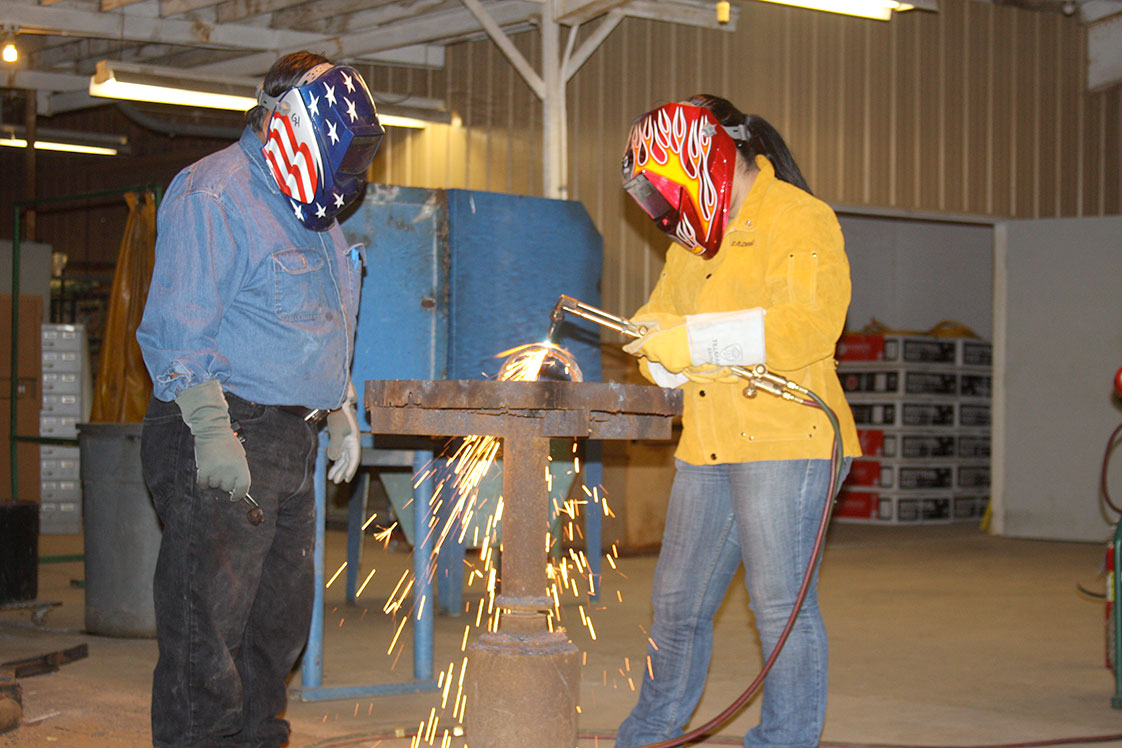Welding Technology
News & Updates
Industry Information
Welding is a skill used by many trades: sheet metal workers, ironworkers, diesel mechanics, boilermakers, carpenters, marine construction, steamfitters, glaziers, repair and maintenance personnel in applications ranging from the sculpture, home-hobbyist to heavy fabrication of bridges, ships, and many other projects. A variety of welding processes are used to join units of metal. As a welder, you may work for shipyards, manufacturers, contractors, federal, state, county, and city governments, firms requiring maintenance mechanics, and repair shops. Many are engaged in work critical to the nation's well-being, such as energy production, highway transportation, manufacturing, and military applications. The arts community also utilizes welding in the creation of sculpture and other forms of expression.
Careers in Welding Technology are for skilled individuals that develop the necessary technical knowledge and skills related to welding processes such as Shielded Metal Arc Welding (Stick), Oxy-Fuel Welding and Cutting, Gas Tungsten Arc Welding (TIG), Gas Metal Arc Welding (MIG), and many other welding processes as defined by the American Welding Society www.aws.org. Welding Technology careers can be realized by completing a Community College Welding Technology Program www.imperial.edu, completing an Apprenticeship Program such as; www.ironworkers.org, www.boilermakers.org, or www.ua.org, On-The-Job training, or through a variety of other methods.
According to the U.S. Bureau of Labor Statistics www.bls.gov, jobs in welding technology will increase by approximately two percent (2%) in the decade 2008-2018. U.S.BLS states that welders who are educated in, trained, and qualified to use the most up-to-date welding processes and techniques will have good career prospects. A sample of the industry sectors in which Welding Technicians participate are; Petroleum and Energy, Aerospace, Transportation, Construction (Structural), Shipbuilding, Marine Repair, Manufacturing, and Industrial Maintenance, to name a few. Note; Due to the high rate of "Baby Boomer" retirements, presently there is a national welding personnel shortage of approximately 250,000 positions throughout the Welding Technology Industry sector.
Degree and Certificate Requirements
| WELD | 100 | Welding Technology | 5.0 |
| WELD | 115 | Flux Cored Arc Welding on Plate | 3.0 |
| WELD | 125 | Gas Tungsten Arc Welding on Plate | 3.0 |
| WELD | 135 | Shielded Metal Arc Welding on Plate | 4.0 |
| WELD | 225 | Gas Tungsten Arc Welding on Pipe | 3.0 |
| WELD | 230 | Shielded Metal Arc Welding on Pipe | 3.0 |
| Total Major Units | 21.0 |
View PDF
https://www.imperial.edu/docs/catalogs-schedules/catalog-archive/2019-2020-catalog/degrees-and-certificates-9/10096-welding-technology-2019-2020/file
Industry Certification and Licensure
Not all welders are required to earn and hold welding certification to any of the numerous Industry Welding Codes. However, some employers prefer to hire Welding Personnel, and Technicians who qualify for, have or have had some type of professional certification, and/or proof of welding competence.
There are literately hundreds of Welding Codes that may apply to a given Welding Technology application. These hundreds of codes are the basis for the many welding certifications individuals may be required to test to and hold.
The three most common Professional Organizations that issue and maintain major Welding Codes and Welder Certifications are:
- Welding Society (structural codes for buildings and bridges)
- American Petroleum Institute (pipelines codes for gas and oil industries)
- American Society of Mechanical Engineers (boiler and pressure vessels codes)
CAREER TECH EDUCATION (CTE) PROGRAM FOR HIGH SCHOOL AND REGIONAL OCCUPATIONAL PROGRAM (ROP) STUDENTS
Imperial Valley College maintains faculty-approved formal course articulation agreements with Imperial Valley high schools and the Imperial Valley ROP (Regional Occupation Program). Courses with articulation agreements follow the California Career Statewide Pathways Templates in the areas of: Administration of Justice, Allied Health Programs, Business, Automotive Technology, Building Construction Technology, Child Development, Computer Information Systems, Health Assistant and Welding.
Students who complete an articulated class offered through a partnering high school or ROP program, receive a qualifying grade in their course, and pass the IVC Credit-by-Exam for the subject area, will be eligible to receive college credit for the articulated corresponding Imperial Valley College class posted to their official transcript. Eligible students will work with the Applied Sciences Office at IVC for the awarding of college credit.
For specific articulation agreements please contact the Applied Sciences Office or the IVC Articulation Officer.
Resources
Imperial Valley College does not promote nor endorse these web sites. They are provided for your reference and convenience only.
- The American Welding Society
- Occupational Safety and Health Administration
- National Center for Welding Education and Training
- United Association Labor Union (UA Pipe-fitters and Steam-Fitters
- American Petroleum Institute
- American Society of Mechanical Engineers
- American Society for Nondestructive Testing
Department Contacts
For more information on the Imperial Valley College Welding Technology Program, please contact the following or visit our campus.
Welding Instructor
Carlos Araiza
Phone:760-355-6419
Email: This email address is being protected from spambots. You need JavaScript enabled to view it.





